Sunday Times 2
The Anagarika’s mission to give Buddhism to the whole world
View(s):The following is the text of the speech delivered by Speaker Karu Jayasuriya at the 153rd birth anniversary celebrations of Anagarika Dharmapala in Buddha Gaya, India last Sunday:
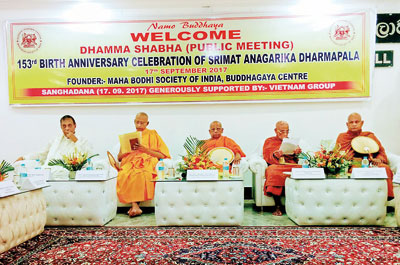
Buddha Gaya, India
It is a great pleasure to be with you to attend the 153rd birth anniversary celebrations of Anagarika Dharmapala, organised by the Mahabodhi Society of India.
Anagarika Dharmapala was one of the illustrious sons of Sri Lanka who made a noteworthy contribution to the cause of Buddhism, the Buddhist revival and the nationalist awakening in Sri Lanka. He made an equally important contribution in the international arena as well.
Anagarika Dharmapala was born David Hewavitarne in Colombo, Ceylon, on September 17, 1864 to a wealthy business family. When Hewavitarne was born, the country had been under British control for many years. Christianity had replaced Buddhism as the religion of much of the population, and the Sinhalese culture was largely lost as a result of the three hundred years of foreign occupation.
Throughout his education, however, Hewavitarne did not lose his belief in Buddhism, his ancestors’ faith. He became influenced by two of the well-known Buddhist leaders of the period, Venerable Hikkaduwe Sri Sumangala Thera and Migettuwatte Gunananda Thera.
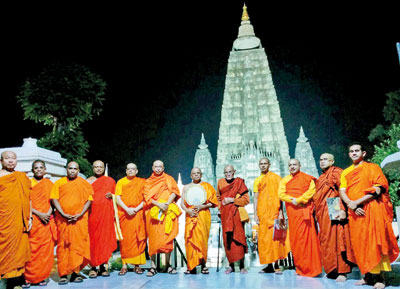
Buddha Gaya, India
Around this time, Ceylon received a pair of interesting guests. One of these, Helena Blavatsky (1831–1891), was a founder of the Theosophical Society. Blavatsky was accompanied by the society’s co-founder, Colonel Henry Steel Olcott. After he dropped out of school, Hewavitarne met Blavatsky and Olcott and joined the Theosophical Society. He acted as a translator to aid Olcott in his efforts to open Buddhist schools throughout the country and revitalise Buddhism. Hewavitarne also became a good friend of Blavatsky, who encouraged him to learn oriental languages such as Pali. Blavatsky also inspired him to work for his people and religion.
Hewavitarne gave up his family wealth and changed his name to Dharmapala, which means “guardian of the Dhamma.” For a first name he took Anagarika, which means “one who has no home”. Working in the interest of the Buddhist people, he served as the general secretary of the Buddhist section of the BTS and was the manager of the newspaper and the press. Dharmapala began writing regularly for the weekly paper, “the Sarasavi-Sandaresa”.
In 1888, he founded an English-language newspaper, “The Buddhist”, and used it to communicate his thoughts about the Buddhist revival and Sinhalese nationalism to the English-speaking community. Dharmapala assisted Olcott in opening more than three hundred schools in the Island.
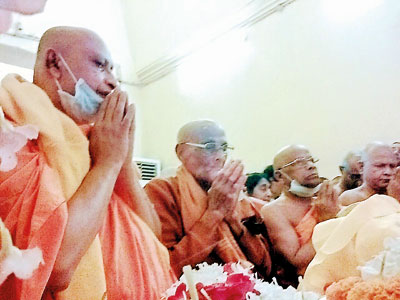
Buddha Gaya, India
In 1888, Dharmapala travelled with Olcott to Japan in order to encourage good relations among the different branches of Buddhism. Three years later Dharmapala and Blavatsky toured in India, the country of Buddhism’s origin. He was appalled at the condition of the sacred Bodhi Tree and the holy place and vowed to surrender his life to rescue it from neglect. When he returned to Ceylon, Dharmapala founded the Maha Bodhi Society in 1891 to restore the temple, and revive Buddhism in India and promote it in the West. In 1892 he founded the Maha Bodhi Journal to aid in this process.
Anagarika Dharmapala gave his first lecture at the Calcutta Albert Hall in October 1891 on the Kinship between Buddhism and Hinduism. He preached his ideas in many countries and was the Buddhist representative to the World Parliament of Religions in Illinois, Chicago, in 1893. He made several other trips to the United States and Europe and wrote widely on Buddhist topics.
When Blavatsky died Dharmapala stopped working with the Theosophical Society. A wealthy American patron, Mary E. Foster, helped finance further tours abroad for him. During an 1896 tour, Dharmapala was able to celebrate the first Vesak Festival in the United States. In 1906 he founded a weekly publication, the Sinhala Bauddhaya, with financial support from Foster. He also continued to travel around the world. He opened new branches of the Maha Bodhi Society in cities such as New Delhi, London, and New York. On a trip to England in 1926, he founded a publication called the British Buddhist, and the following year he led that nation’s first Wesak Festival.
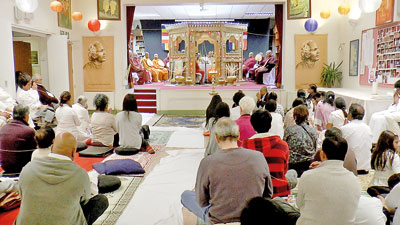
Britain
First, he revitalised Buddhism in Sri Lanka, the home of the religion’s oldest school, and in India, the religion’s birthplace. Second, he introduced Buddhist teachings throughout Asia, North America, and Europe. Third, he awakened a Sinhalese nationalism which had been inactive due to so many centuries of foreign rule. He spoke out for an independent Ceylon free of British rule. Dharmapala left behind a large body of published work, including Return to Righteousness: A Collection of Speeches, Essays, and Letters of the Anagarika Dharmapala, and many writings on Buddhism.
He was in Calcutta when the 1915 riots broke out in Sri Lanka. He was not permitted to leave Calcutta from June 1915 to 1920. He continued his missionary work and built Viharas in Calcutta and Sarnath and established the British Buddhist Mission in 1926 in a house purchased from the money from the firm H. Don Carolis, the trustees of his father’s estate, and from Mrs. Mary Foster, who was giving a monthly donation.
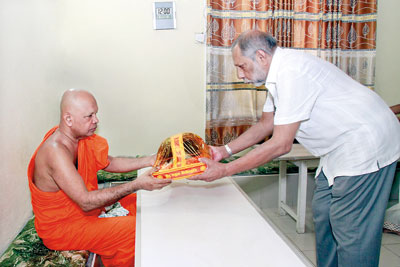
Sri Lanka
His life’s work dedicated to restoring the message of the Buddha in the land of its birth, India and in refashioning it in the island of Sri Lanka became a transformative influence on both countries. He later extended his efforts to many other countries of both East and West and became an acknowledged spokesman for Theravada Buddhism.
With his varied commitments Dharmapala had to adapt his strategies to suit the different groups that he addressed. He was sensitive to the nature of his audience, be it in Chicago when he addressed the Parliament of Religions in 1893, the British officials including the Viceroy of India, Lord Curzon, the future president of India, Rajendra Prasad to mediate in the Bodhgaya dispute, the Mahayanist Buddhist monks of Japan, European scholars of textual Buddhism like Max Muller, Rhys Davids and Paul Carus and especially the Sinhala Buddhists of his motherland who were under a colonial regime.
In his diary for 1918 Dharmapala writes: “Like a chess player, I have to be careful. In softness and in gentleness I have to sing the song of the Buddha and give its cream to the world.”
He spent his last years in Sarnath having completed the Mulagandhakuti Vihara there. His last visit to Sri Lanka was in 1931 when he established the Anagarika Dharmapala Trust. On 31 July 1931, he was ordained as a Buddhist monk with the name Sri Devamitta Dhammapala and received higher ordination in January 1933. He died at Sarnath on 29 April 1933. His last words were “Let me be reborn… I would like to be born again twenty five times to spread Lord Buddha’s Dhamma”.
Let the blessings of the Noble Triple Gem be on you! Thank you.
- Commemoration events were held around the world to mark the 153rd birth anniversary of Anagarika Dharmapala.
- Top left: Speaker Karu Jauyasuirya is seen here with the Most Venerable Mahanayake Theras of Asgiriya, Ramanya and Amarapura Chapters and the Anunayake Thera of the Malwatte Chapter during the Buddha Gaya ceremony
- Top right: Most Venerable Mahanayake Theras arriving at Buddha Gaya to participate in the Dhamma Sabha organised by Maha Bodhi Society of India
- Above left: Mahanayake Theras taking part in the commemoration ceremony in Buddha Gaya
- Above right: The pirith ceremony at the London Buddhist Vihara
- Left: An alms giving held in memory of the Anagarika Dharmapala at the Vidyodaya Pirivena in Maligakande, Colombo. Chairman of the Anagarika Dharmapala Trust Sudhammika Hewavitarne seen presenting ata-pirikara to the Chief Incumbent Ven. Balangoda Sobitha Maha Thera.

